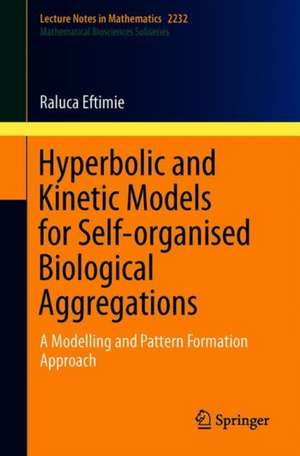Hyperbolic and Kinetic Models for Self-organised Biological Aggregations: A Modelling and Pattern Formation Approach: Lecture Notes in Mathematics, cartea 2232
Autor Raluca Eftimieen Limba Engleză Paperback – 8 ian 2019
Din seria Lecture Notes in Mathematics
- 17%
 Preț: 360.43 lei
Preț: 360.43 lei -
 Preț: 459.92 lei
Preț: 459.92 lei -
 Preț: 121.41 lei
Preț: 121.41 lei -
 Preț: 175.68 lei
Preț: 175.68 lei -
 Preț: 197.00 lei
Preț: 197.00 lei -
 Preț: 279.76 lei
Preț: 279.76 lei -
 Preț: 477.66 lei
Preț: 477.66 lei - 17%
 Preț: 361.89 lei
Preț: 361.89 lei -
 Preț: 252.37 lei
Preț: 252.37 lei -
 Preț: 353.99 lei
Preț: 353.99 lei -
 Preț: 138.88 lei
Preț: 138.88 lei -
 Preț: 152.61 lei
Preț: 152.61 lei -
 Preț: 116.67 lei
Preț: 116.67 lei -
 Preț: 102.77 lei
Preț: 102.77 lei - 17%
 Preț: 365.53 lei
Preț: 365.53 lei -
 Preț: 396.76 lei
Preț: 396.76 lei - 17%
 Preț: 362.15 lei
Preț: 362.15 lei -
 Preț: 396.13 lei
Preț: 396.13 lei -
 Preț: 357.80 lei
Preț: 357.80 lei - 17%
 Preț: 362.31 lei
Preț: 362.31 lei -
 Preț: 403.81 lei
Preț: 403.81 lei - 17%
 Preț: 361.73 lei
Preț: 361.73 lei -
 Preț: 499.87 lei
Preț: 499.87 lei -
 Preț: 457.03 lei
Preț: 457.03 lei -
 Preț: 395.91 lei
Preț: 395.91 lei -
 Preț: 459.00 lei
Preț: 459.00 lei -
 Preț: 487.57 lei
Preț: 487.57 lei -
 Preț: 424.01 lei
Preț: 424.01 lei -
 Preț: 487.57 lei
Preț: 487.57 lei -
 Preț: 330.55 lei
Preț: 330.55 lei -
 Preț: 325.75 lei
Preț: 325.75 lei -
 Preț: 350.30 lei
Preț: 350.30 lei -
 Preț: 331.31 lei
Preț: 331.31 lei -
 Preț: 408.37 lei
Preț: 408.37 lei -
 Preț: 328.25 lei
Preț: 328.25 lei -
 Preț: 421.28 lei
Preț: 421.28 lei -
 Preț: 276.08 lei
Preț: 276.08 lei -
 Preț: 424.60 lei
Preț: 424.60 lei -
 Preț: 422.05 lei
Preț: 422.05 lei -
 Preț: 505.01 lei
Preț: 505.01 lei -
 Preț: 422.05 lei
Preț: 422.05 lei -
 Preț: 274.93 lei
Preț: 274.93 lei -
 Preț: 335.16 lei
Preț: 335.16 lei -
 Preț: 422.27 lei
Preț: 422.27 lei -
 Preț: 497.49 lei
Preț: 497.49 lei -
 Preț: 272.81 lei
Preț: 272.81 lei -
 Preț: 428.04 lei
Preț: 428.04 lei -
 Preț: 376.22 lei
Preț: 376.22 lei -
 Preț: 427.10 lei
Preț: 427.10 lei -
 Preț: 325.92 lei
Preț: 325.92 lei
Preț: 388.13 lei
Nou
Puncte Express: 582
Preț estimativ în valută:
74.27€ • 79.42$ • 61.92£
74.27€ • 79.42$ • 61.92£
Carte tipărită la comandă
Livrare economică 18 aprilie-02 mai
Preluare comenzi: 021 569.72.76
Specificații
ISBN-13: 9783030025854
ISBN-10: 3030025853
Pagini: 265
Ilustrații: XIII, 280 p. 73 illus., 59 illus. in color.
Dimensiuni: 155 x 235 x 15 mm
Greutate: 0.42 kg
Ediția:1st ed. 2018
Editura: Springer International Publishing
Colecția Springer
Seriile Lecture Notes in Mathematics, Mathematical Biosciences Subseries
Locul publicării:Cham, Switzerland
ISBN-10: 3030025853
Pagini: 265
Ilustrații: XIII, 280 p. 73 illus., 59 illus. in color.
Dimensiuni: 155 x 235 x 15 mm
Greutate: 0.42 kg
Ediția:1st ed. 2018
Editura: Springer International Publishing
Colecția Springer
Seriile Lecture Notes in Mathematics, Mathematical Biosciences Subseries
Locul publicării:Cham, Switzerland
Cuprins
- Introduction. - A Short Introduction to One-Dimensional Conservation Laws. - One-Equation Local Hyperbolic Models. - Local Hyperbolic/Kinetic Systems in 1D. - Nonlocal Hyperbolic Models in 1D. - Multi-Dimensional Transport Equations. - Numerical Approaches for Kinetic and Hyperbolic Models. - A Few Notions of Stability and Bifurcation Theory. - Discussion and Further Open Problems.
Recenzii
“The monograph can primarily be used as a research companion, as it provides a vivid perspective of the state-of-art in its field. … The monograph, which is largely self-contained, can also be used as a basis for a graduate course or a research seminar on self-organized biological aggregation, the dual analytical and numerical perspective allowing for some tailoring to different purposes.” (Paul Georgescu, zbMATH 1415.92002, 2019)
Notă biografică
Dr. Eftimie completed her PhD in Applied Mathematics at the University of Alberta, Canada. For her PhD work on the modelling and classification of aggregation patterns in self-organised biological aggregations (which could result from various inter-individual communication mechanisms), she was honoured with the 2008 CAIMS Cecil Graham Doctoral Dissertation Award (Canada). Dr. Eftimie is currently a Reader (Associate Professor) of Applied Mathematics at the University of Dundee, United Kingdom.
Textul de pe ultima copertă
This book focuses on the spatio-temporal patterns generated by two classes of mathematical models (of hyperbolic and kinetic types) that have been increasingly used in the past several years to describe various biological and ecological communities. Here we combine an overview of various modelling approaches for collective behaviours displayed by individuals/cells/bacteria that interact locally and non-locally, with analytical and numerical mathematical techniques that can be used to investigate the spatio-temporal patterns produced by said individuals/cells/bacteria. Richly illustrated, the book offers a valuable guide for researchers new to the field, and is also suitable as a textbook for senior undergraduate or graduate students in mathematics or related disciplines.
Caracteristici
Discusses various hyperbolic and kinetic mathematical models for stationary and moving biological/ecological aggregations formed in response to local and nonlocal social interactions Demonstrates how stability and bifurcation theory combined with numerical simulations can be used to investigate and classify the spatio-temporal patterns displayed by these mathematical models Includes real-world examples
